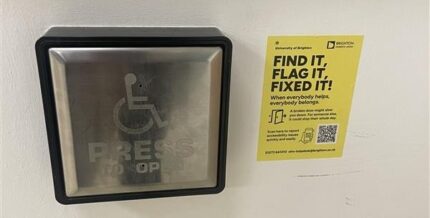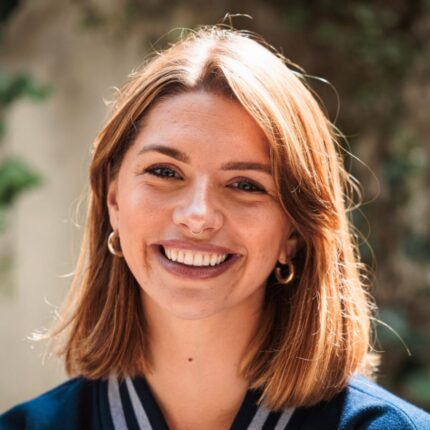Over the past month I’ve been using three “f” words at my university.
I don’t mean swear words, I’m talking about my disability awareness campaign that has got everyone talking – find it, flag it, fixed it.
As Communities Officer at Brighton SU one of my main goals is to build a campus culture where we look out for one another. University should be a place where all students feel seen, valued and most importantly understood.
And what better way to truly understand someone else than to experience life from their point of view.
Finding the problem
Not long after I was elected, a student invited me to experience life on campus in a manual wheelchair. The vice chancellor, several other university leads, and SU staff were also going to join.
Within minutes I was faced with accessibility obstacles I’d never even considered. I experienced faulty key card access, heavy doors that were impossible to open alone and complicated layouts that made simple navigation a challenge.
And these were just the physical barriers on one small part of campus. This experience opened my eyes to the challenges disabled students face every day all whilst trying to get to lectures on time.
In recent years Brighton University has taken major steps to improve accessibility. Accessibility is such a complex issue with daily challenges – doors break, lifts fail and pathways get blocked.
And when things go wrong it is always the same students who have to go out of their way to report it. Everyone else just assumes “someone else will deal with it,” and the ineffective blame cycle continues.
It became clear to me that if we really want to improve accessibility, it’s time to rewire the mindset. We have to change a culture, not just policy.
It’s not just the physical barriers, it’s also social barriers and we all need to play our part. Even if an issue doesn’t affect you directly, reporting it and getting it fixed quickly could make a huge difference in someone’s experience.
Flagging it
The old reporting process was long, complicated and confusing. Most people didn’t have the time or even know where to start. So I thought let’s make this easy.
I came up with a QR code to cut out the faff and quickly streamline this process.
Let’s say a student finds an accessibility issue on campus (e.g. key card scanner not working), they would scan the QR code on a nearby poster which would pop up the email app pre-filled with all the important details. Students can then add the location and a quick description of the issue and hit send. And if that still feels like too much effort, you can call the helpdesk instead.
I knew this campaign needed a name that was going to be both eye-catching and memorable so after much deliberation over the choice of grammar, “Find it, flag it, fixed it” was born.
I reached out to our estates team and they immediately offered to fund the printing and branding. Working in partnership with the university we realised that this wasn’t just a new and more simplified way of reporting issues, it was also going to provide the university with a heat map of key problem areas. This is the vital evidence they need to be able to prioritise improvements and make Brighton truly accessible for everyone.

These little yellow stickers have now cropped up all over campus and are more than just about logging issues. They are a way to encourage people to notice what’s going on around them, to empower people to support others and most importantly they are about making accessibility everyone’s responsibility.
Fixed it!
Improving accessibility is just one part of my wider awareness campaign. At Brighton around 35 per cent of students have a declared disability, neurodivergence, or chronic illness. That’s over a third of our student community.
Another part of my campaign is the “Disability Ally Pledge.” Being an ally is so important and it’s something I care about deeply and taking the time to understand one another is how we truly create a more compassionate campus.
The pledge is something that both students and staff can sign up for to show their support for people with visible and hidden disabilities. This pledge will be co-created with students, and it’s important that every student who wants to be involved can see their voice reflected in the project.
As part of this project we’ve set up a new student forum, funded by the university and co-chaired by myself and the Pro-Vice-Chancellor for Education and Student Experience. This forum provides a platform for disabled students to raise issues, share experiences and directly influence institutional change.
Improving support for disabled students is about more than just quick fixes, it’s the start of something much bigger – it’s about changing a culture so that when everybody helps, everybody belongs.


















